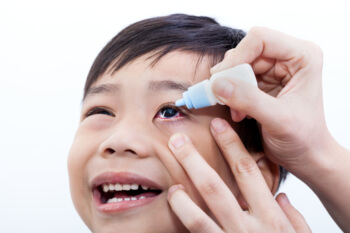Pinkeye, or conjunctivitis, is an inflammation of the eye that can be highly infectious. While noninfectious forms can be caused by allergies, chemical irritations, and underlying illnesses in the body, the more serious variation results from virus or bacteria. Some problems that appear to be pinkeye may respond to treatment at home, but it is important to know when to call your primary care provider or your eye doctor. Any eye condition that you leave untreated can cause long-term damage to your eyes.
Symptoms Of Conjunctivitis
Characterized redness in and around the eyes, pinkeye is often accompanied by other symptoms such as:
- Eye pain
- Eye discharge
- Eyelids “glued” shut
- Itching in the eyes
- A discharge of pus or mucus
- Swollen lymph nodes
- Coughing
- Earache
- Runny nose
What Is Causing The Symptoms?
Some of these symptoms might result from irritations to eye such as seasonal allergies, irritants in the air, or chemicals that make contact with the eyes, like chlorine from a swimming pool. Considered chemical pinkeye, these conditions are often remedied with over-the-counter antihistamines medications or allergy medications prescribed by your doctor. Until the pain subsides, placing a clean washcloth soaked in ice water over your eyes can offer relief. This type of pinkeye usually clears up once the irritant is out of your eye or after you started taking antihistamines.
Other causes of symptoms similar to pinkeye might be a cold, a sty, inflamed eyelid glands (chalazion), or inflamed skin near the eyelids (blepharitis). Applying a warm, wet washcloth and using eye drops or artificial tears might offer relief.
Viral Or Bacterial Pinkeye
Infectious conjunctivitis can result from bacterial or viral causes. While bacterial pinkeye will respond to antibiotic eye drops or antihistamines, the viral type will not. Using artificial tears might offer some relief, but like most viruses, viral pinkeye needs to run its course. Since it is highly infectious, you should make sure not to share towels, washcloths, cosmetics, eye drops, or pills with others. You should throw away any eye products you have used while you have pinkeye, such as makeup or contact lenses. These conditions are most common in children, and they should be kept home from school until the pinkeye is under control.
Viral pinkeye is most often caused by adenoviruses, but it can also be an offshoot of viruses, such as herpes simplex (HSP) human immunodeficiency virus (HIV), varicella zoster virus (VZV), and many others. With symptoms lasting 1 to 2 weeks, this variation of pinkeye is associated with cold-like symptoms, swollen puffy eyes and eyelids, watery discharge, and a sensitivity to light.
Staphylococci and streptococci bacteria usually cause bacterial pinkeye, although chlamydia and gonococci can cause it too. This type of pinkeye is also associated with cold-like symptoms; the lymph nodes in front of the ears might be swollen and you may experience a considerable amount of thick yellow or green discharge from the eyes.
Seeking Medical Treatment
If you have mild symptoms that may be caused by pinkeye, you might wonder whether you should immediately call the doctor. The common wisdom is to treat the symptoms with hot or cold compresses and over-the-counter eye products for up to two weeks; call your primary provider or your eye doctor if the redness and other symptoms do not subside. In the meantime, make sure to wash your hands frequently and avoid rubbing your eyes.
You should seek immediate medical attention in the following case:
- Yellow or green discharge from the eyes
- Your eyelids are stuck together in the morning
- High fever, face paint, shaking chills, or vision loss
- Severe eye pain when you look into a bright light
- Blurred vision, double vision, or halos around objects
If your symptoms prove to be bacterial conjunctivitis, you may have infections elsewhere in the body, so an oral antibiotic and antibiotic drops or ointment might be prescribed by your provider.
Raintree Medical And Chiropractic Center Can Help
When you are experiencing symptoms of conjunctivitis, make a visit to Raintree Medical and Chiropractic Center your first stop for assessment of your condition. We accept walk-in, but for best service schedule an appointment online or call us today at 816-623-3020.

